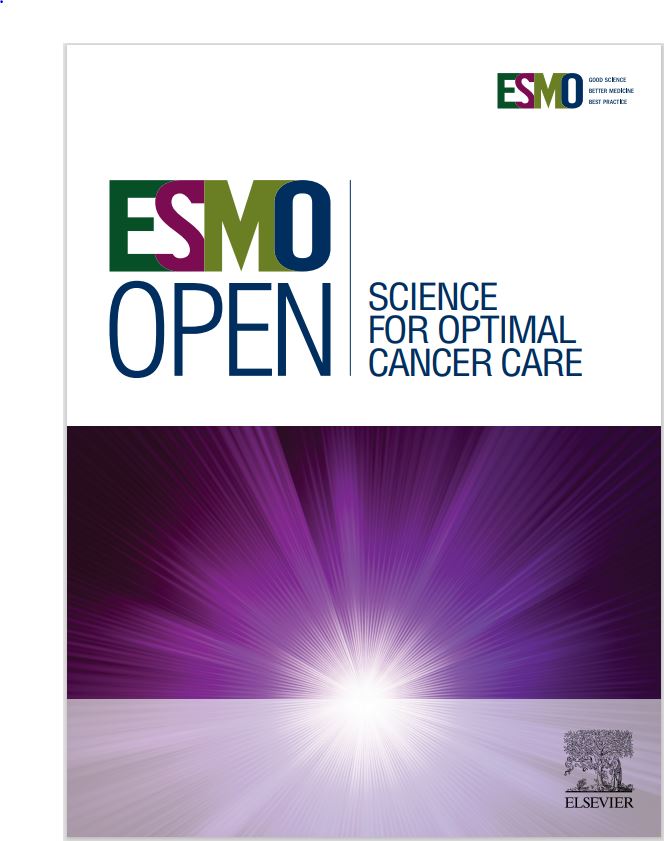在一项总式试验(KCSG HN 15-16 TRIUMPH试验)中确定头颈部鳞状细胞癌的预测标志物。
IF 8.3
2区 医学
Q1 ONCOLOGY
引用次数: 0
摘要
背景:复发或转移性头颈部鳞状细胞癌(HNSCC)预后较差。有限的治疗选择突出了对精确治疗的需求。患者和方法:我们研究了不同临床特征和遗传变化之间的相关性,使用了我们最近的伞式试验中获得的下一代测序数据。我们分析了419名HNSCC患者的靶向DNA和RNA测序数据谱,这些患者参加了最近的基于基因组学的伞式试验。我们进行了包括生存分析在内的综合分析,以评估总体遗传景观、突变特征模式、拷贝数变化及其与患者预后的相关性。结果:多种基因组畸变是接受靶向治疗的患者的预测因素。NOTCH1突变和MYC扩增与预后差相关(P = 0.0037和P = 0.0016)。CDKN2A突变影响CDK4/6抑制剂治疗患者的临床结果,根据突变类型(缺失可改善生存,SNV/indel可降低生存),其影响存在差异。在TRIUMPH试验期间接受免疫治疗的患者中,p16阳性与良好的预后相关。这些群体的分层揭示了新的基因组特征,例如hpv阳性口咽癌中TP53和PIK3CA SNV/indels之间的相互排他性,以及年轻口腔癌患者中TP53突变的高患病率,这与种系易感突变、吸烟习惯或p16表达无关。结论:基因组谱分析在复发或转移性HNSCC的治疗中起着重要作用,可能有助于确定精确治疗的潜在靶点。本文章由计算机程序翻译,如有差异,请以英文原文为准。
Identifying predictive markers of head and neck squamous cell carcinoma in an umbrella trial (KCSG HN 15-16 TRIUMPH trial)
Background
Recurrent or metastatic head and neck squamous cell carcinoma (HNSCC) is associated with a poor prognosis. Limited treatment options highlight the need for precision therapeutics.
Patients and methods
We investigated the correlation between diverse clinical features and genetic changes using next-generation sequencing data derived from our recent umbrella trial. We analyzed the targeted DNA and RNA sequencing data profiles of 419 patients with HNSCC enrolled in the recent genomic-based umbrella trial. Comprehensive analyses, including survival analysis, were conducted to assess the overall genetic landscape, mutational signature patterns, copy number variations, and their correlation with patient outcomes.
Results
Multiple genomic aberrations served as predictive factors in patients treated with targeted therapies. NOTCH1 mutations and MYC amplification were associated with worse prognosis (P = 0.0037 and P = 0.0016, respectively). CDKN2A mutations influenced the clinical outcome of patients treated with CDK4/6 inhibitors, with divergent effects based on mutation types (improved survival with deletions and poor survival with SNV/indels). p16 positivity was correlated with a favorable prognosis in patients who underwent immunotherapy during the TRIUMPH trial. Stratification of such groups revealed novel genomic characteristics, such as mutual exclusiveness between TP53 and PIK3CA SNV/indels in HPV-positive oropharyngeal cancer, along with a high prevalence of TP53 mutations in young patients with oral-cavity cancer, which were unrelated to germline predisposing mutations, smoking habits, or p16 expression.
Conclusion
Genomic profiling plays a significant role in the management of recurrent or metastatic HNSCC and may help identify potential targets for precision therapeutics.
求助全文
通过发布文献求助,成功后即可免费获取论文全文。
去求助
来源期刊

ESMO Open
Medicine-Oncology
CiteScore
11.70
自引率
2.70%
发文量
255
审稿时长
10 weeks
期刊介绍:
ESMO Open is the online-only, open access journal of the European Society for Medical Oncology (ESMO). It is a peer-reviewed publication dedicated to sharing high-quality medical research and educational materials from various fields of oncology. The journal specifically focuses on showcasing innovative clinical and translational cancer research.
ESMO Open aims to publish a wide range of research articles covering all aspects of oncology, including experimental studies, translational research, diagnostic advancements, and therapeutic approaches. The content of the journal includes original research articles, insightful reviews, thought-provoking editorials, and correspondence. Moreover, the journal warmly welcomes the submission of phase I trials and meta-analyses. It also showcases reviews from significant ESMO conferences and meetings, as well as publishes important position statements on behalf of ESMO.
Overall, ESMO Open offers a platform for scientists, clinicians, and researchers in the field of oncology to share their valuable insights and contribute to advancing the understanding and treatment of cancer. The journal serves as a source of up-to-date information and fosters collaboration within the oncology community.
 求助内容:
求助内容: 应助结果提醒方式:
应助结果提醒方式:


